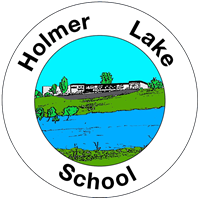Writing
Curriculum Leaders - Mrs. Watson and Miss. Baylis
Subject Leader - Miss. Leeming and Miss. Baylis
Link Governor - Mrs. Williams
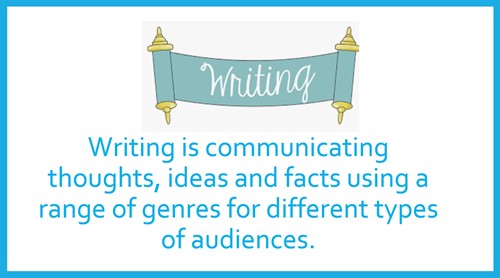
‘English has a pre-eminent place in education and in society. A high-quality education in English will teach pupils to speak and write fluently so that they can communicate their ideas and emotions to others, and through their reading and listening, others can communicate with them.’ (National Curriculum, 2014)
At Holmer Lake Primary School, we aim to instil an enjoyment of writing in all our children. Our Writing curriculum is designed to ensure that children are equipped with a strong command of the written language.
The aims for teaching the Writing curriculum are to develop pupils who:
- engage with exciting writing opportunities and experiences to become successful writers
- acquire a wide vocabulary through exposure to a range of different writing materials
- develop a solid understanding of grammar and apply it effectively in their writing
- write clearly, accurately, and coherently
- adapt their language and style in and for a range of contexts, purposes, and audiences
- use their sound knowledge of phonics as a springboard to becoming fluent writers
- learn how to spell new words effectively and where necessary, apply spelling patterns and rules
- take pride in the presentation of their writing, in part by developing legible, cursive handwriting style
These aims are embedded across our Writing lessons and the wider curriculum. We believe that a secure knowledge and understanding of the English language is crucial to a high-quality education and will equip our children with the tools they need to participate fully as a member of society.
We follow the National Curriculum for writing. We have designed a bespoke writing cycle which ensures a consistent, logical sequence of lessons to ensure that new knowledge and skills are built on what has been taught before from Reception through to Year 6. This enables our pupils to know more and remember more.
The golden threads of our Writing curriculum are:
- Vocabulary
- Grammar
- Punctuation
- Spelling
- Composition
EYFS
The golden threads of the Writing curriculum are established in EYFS. Pupils begin to correctly form recognisable letters; spell words by identifying sounds and write CVC words, simple phrases and sentences that can be read by others.
SMSC and British Values
We aim to develop Spiritual, Moral, Social and Cultural values through the writing curriculum. Children read a range of high-quality texts that explore values to inform their perspective on life and respect for other people.
Inclusion
At Holmer Lake Primary School, we actively seek to remove the barriers to learning and participation that can hinder or exclude individual or groups of pupils. All children benefit from quality first teaching in the classroom where teachers set high expectations, cater for the needs of individuals, and provide opportunities for all pupils to achieve and progress. Teachers are aware that pupils bring different experiences, interests, and strengths to school which influence the way they learn. Teachers plan and adapt their approaches to teaching and learning so that all pupils can take part in lessons fully and effectively. For example, in writing, a pupil may require a simplified version of the text, peer work with a pupil who is working at greater depth or an adapted success criterion.

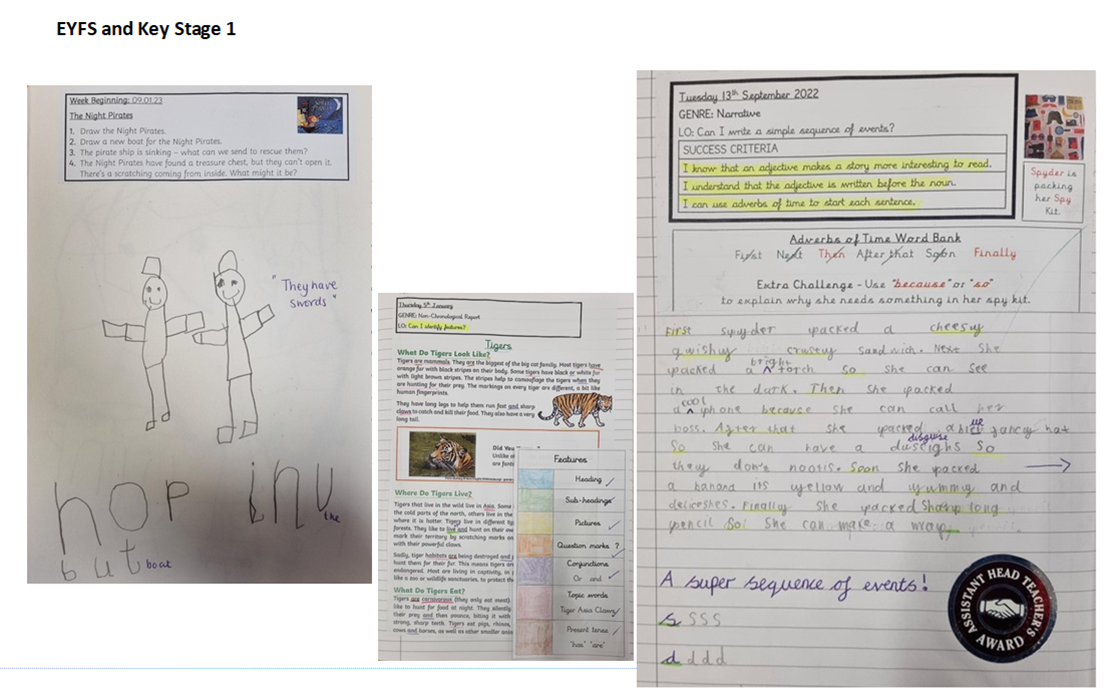
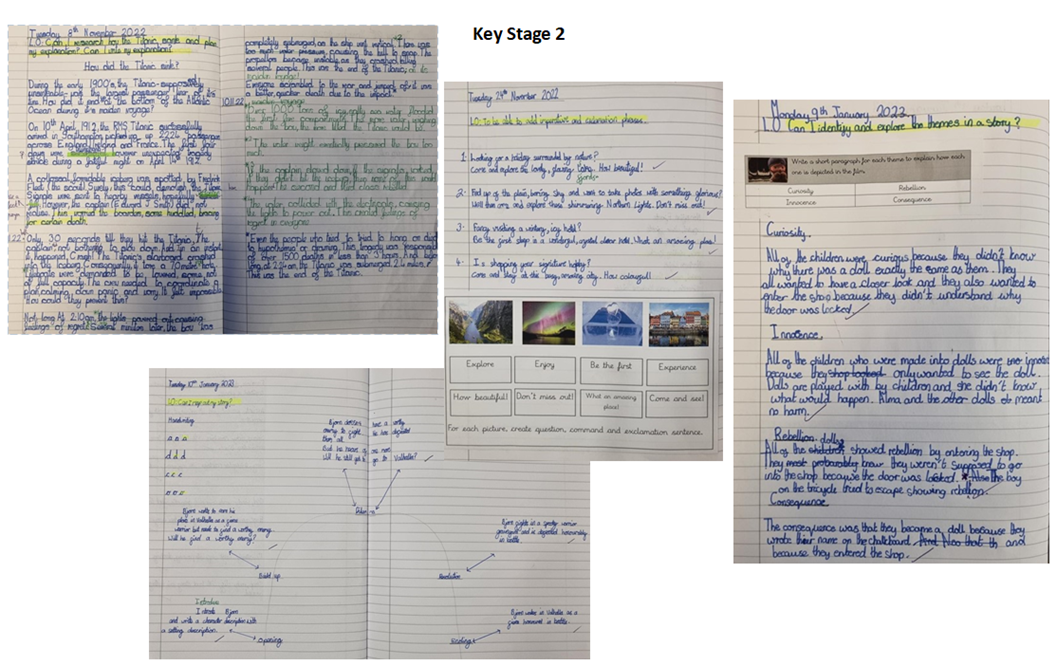

Implementation of Writing
The Writing Cycle
In EYFS, writing is taught initially with daily “drawing club”. Children use the stimulus of stories to mark make and then build to writing letters, CVC words and sentences. In Year 1, they build on their knowledge and skills from EYFS and adopt a modified version of the bespoke writing cycle to ensure a smooth transition. As the children progress through the year, the writing cycle develops to ensure they are ready for the transition into Year 2. Writing is taught across 4 lessons from Year 2 upwards.
Each term, each class studies a different high-quality novel which is often linked to their learning across the curriculum. This text is studied through daily reading lessons, and it is used to support the teaching and learning of writing where appropriate. We strongly believe that reading and writing are inextricably linked therefore studying the text in both reading, writing and across the curriculum encourages children to make links and become more empathetic and ambitious writers.
Our Writing Cycle
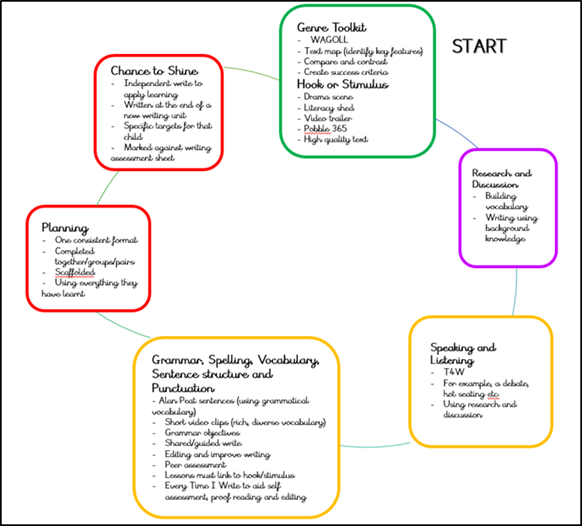
A class yearly overview, half-termly planning and class genre overviews are used to ensure that a variety of genres are progressively taught and built upon throughout the year and across the key stages. Writing is also a key focus in Science and the foundation subjects. Children are given the opportunity to transfer and build upon their knowledge and skills studied in their writing lessons and apply these across the curriculum.
Genre Overview example.
To ensure writing is taught for a range of different purposes and that we are covering the appropriate genres in the appropriate year groups, the table below outlines how many pieces of writing must be completed independently and assessed across the academic year.

Through our bespoke writing cycle, children will acquire and learn the skills to plan, draft and edit their written work overtime. They are encouraged to develop their independence in being able to identify their own areas for improvement. Within each writing cycle, sequenced lessons ensure that prior learning is checked and built upon and that the National Curriculum objectives are taught through a combination of approaches and opportunities. Some examples include:
- exploring features of a different text types
- studying modelled examples (WAGOLL – what a good one looks like)
- participating in shared whole class writing
- discussing strengths and areas for improvement in their own writing and in others
- collating ambitious vocabulary through reading
- developing a range grammatical skills and sentence structures
- planning, drafting, editing, and up-levelling
- writing independently
- practising handwriting
- practising and learning spellings
Grammar and Punctuation
Through the "hold a sentence" element of the Read Write Inc lessons, children in EYFS and Y1 begin to learn how to construct and punctuate simple sentences. From Year 1 upwards, Grammar and Punctuation is taught through our writing cycle and discretely for 15 minutes each day. (From Spring Term in Y1)
Handwriting
The teaching of handwriting at Holmer Lake begins in EYFS where the children are taught to: sit properly to ensure the correct posture for writing, how to hold a pencil in the correct position and develop a legible handwriting style. This is further supported through the Read Write Inc programme.
Additionally in Early Years, daily exercises, dances and games are used:
- to strengthen fine motor skills in the hand and wrist needed for writing
- to practise the large movements that help children develop the fine muscle control they need for writing.
From KS1 upwards, children are taught cursive handwriting through a handwriting scheme (Letterjoin) which provides a systematic, differentiated, and progressive approach.


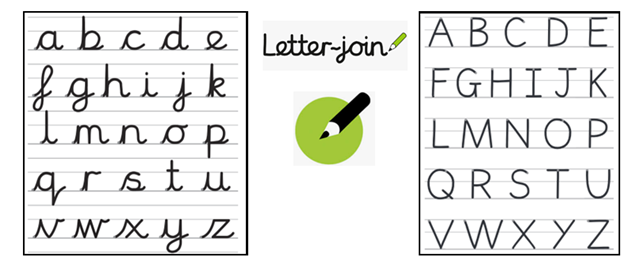
Spelling
In EYFS and Year 1, spellings are taught through the Read Write Inc programme. From Year 2 upwards, classes follow a bespoke progressive spelling scheme which focuses on teaching spelling the graphemes for all 44 phonemes. Spelling patterns and rules are taught where necessary. We aim to create confident and proficient spellers using a discrete teaching approach underpinned by phonics. Spelling is taught daily.
Spelling is taught daily using a bespoke progressive spelling scheme.

Speaking and Listening
Spoken language underpins the development of reading and writing. The quality and variety of language that pupils hear and speak are vital for developing their vocabulary and grammar and their understanding for reading and writing (National Curriculum, 2014). Opportunities are provided for children to develop their spoken language across the curriculum. Through discussion, pupils’ confidence, competency and listening skills are embedded.
Writing Assessment
Each piece of writing is assessed using our Writing Assessment grids for the appropriate year group.
An example of our Writing Assessment Grids.
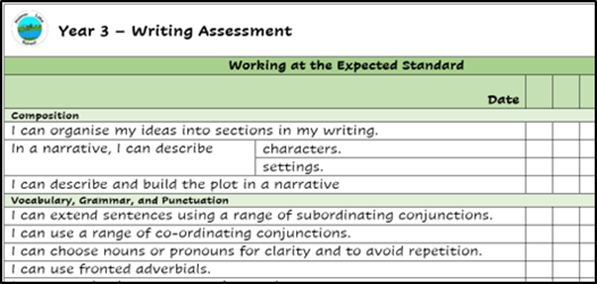
Individual targets are set and shared after each piece of assessed writing.
Every Time I Write mats are writing prompts that address the SPAG non-negotiables for each year group. Children use these mats as a prompt and self-assessment when they are writing.
An example of an Every Time I Write mat.

